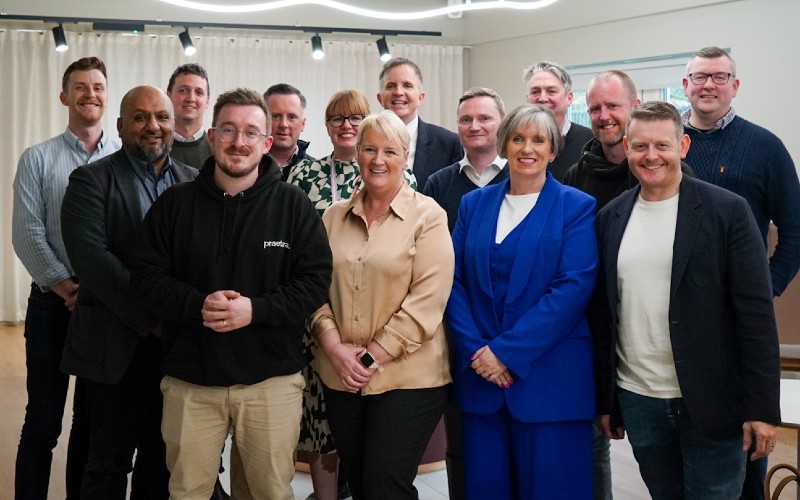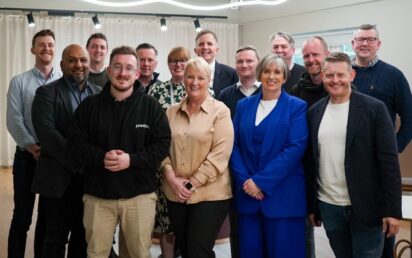Lancashire has an established investment ecosystem but what more can be done in the notoriously underfunded early-stage space?
Lancashire County Council joined forces with BusinessCloud to identify the missing piece of the jigsaw.
Where are the angel investors? Are the routes to pre-seed and seed investment signposted well enough? Do university spinouts know where to go? Are private equity and venture capitalists interested in early-stage companies?
These were some of the questions discussed by a panel of founders, investors and intermediaries.
What do investors want?
Amin Vepari is the business finance and scale up lead at Lancashire County Council and shared a quote he’d recently read on LinkedIn.
“There’s no reason why Lancashire can’t be the Brooklyn to Manchester’s New York,” he said. “I loved that quote when I read it. Give that some thought. If you’ve been to Brooklyn and New York you’ll know exactly what I’m talking about.
“We have to build around what angel investors want. We have to focus on the investors as well as the founders because they’re the ones putting their money here.
“You’ve got to have people that care. There are lot of things underway but it’s about piecing it all together and making a difference.”
County is unique
Matt Currie is an investment director and growth investor at Seneca Partners and said Lancashire needed to be play to its strengths
“We need to create an ecosystem that is unique to Lancashire and the North West,” he said. “Sometimes we can think ‘Manchester does it well, Liverpool does it well, we need some of these incubators’.
“The ecosystem has to work for everyone in it and I think fundamentally the biggest gap is finding one that works for angels. In my view Lancashire’s angels are slightly unique. They are a bit more down to earth and a bit more camera shy than the ones you get in central London or on the middle of Manchester.”
Share success
Rory Southworth is the investment ecosystem lead at FHundED and the manager of Lancaster-based Fraser House, which is now home to 120 tech businesses.
Southworth said replicating the community-focused approach in Fraser House across Lancashire would be a game-changer.
“Let’s take what we’ve got in Lancaster and take it across the county,” he said. “I’m trying to find key people in those regions that I can work alongside.”
Create space to grow
Mike Gibson is the CEO of EV charging management software firm Fuuse, which raised a £2.5m investment round in 2023 led by Par Equity.
He was the also the founder of Digital Lancashire and said: “We need to celebrate success. We don’t do enough of that in Lancashire. The bigger one for me is create spaces to grow. There are amazing spaces in Manchester and Liverpool but there isn’t really in Lancashire. Fraser House is that.
“Events like this are really useful. I’ve always been told that a CEO should be a ‘chief explorer of opportunities’. We have to get out there and meet people.
‘Lancashire needs actions, not words’ to realise business potential
“We need to build on what works and not what doesn’t. It’s all well and good to say you can build a Fraser House in every town. That doesn’t work. You have to accept what the strengths are in that local community.
“It all starts at schools and universities. One of the proudest things I’ve ever done is the digital advantage programme in Lancashire. That’s been an inspirational programme.”
Tell the story
Sue Barnard is a senior investment manager at British Business Bank, which has recently launched the £660m Northern Powerhouse Investment Fund 2.
She said: “Create the space but more importantly tell everyone about the space. You can’t keep companies in Lancashire if you haven’t got that space.
“Tell the story. I promote everyone and anyone who gets investment, whether it’s from us or someone else. With people like Praetura Ventures (as partners) I know we’ll tell the story. If we do a deal everyone will know about it.”
Cash with support
Praetura Ventures will manage equity deals up to £5m in the Northern Powerhouse Investment Fund 2.
Group marketing director Ben Davies: “This won’t surprise you but for me the missing piece of the jigsaw is cash with the right support and the right education at the really early-stage is still the thing that we have to focus on in the next five years.
“We also need to celebrate our successes but also not only the break-out businesses but also the people who are creating the ecosystem.
“We’re big enough to be globally ambitious here but small enough to root for each other. It’s amazing how if you need help from someone down the road to you they’ll generally give it in North of England. I personally don’t think you get this in the South East. We have a period of time to leverage that.”
University links
Matthew Hirst is the CEO of Chorley-based energy tech firm ESG and said Lancashire needed an established business community
“For me it’s brilliant being in Lancashire for our UK HQ,” he said. “Not everyone wants to go into the city and there’s a lot of tech talent in Lancashire. What we need better for companies like ours are links into universities so we can bring that tech talent through, even to the point of influencing some of the programmes of the graduates that are coming out.
“I don’t think there’s a problem of attracting investment into companies in Lancashire. On the contrary, Lancashire-based companies are attracting finance from Manchester, London, even the States.
“The caveat is that once you’re at a certain level. If you’re at a couple of million ARR I think it’s quite easy. From what I’m hearing today it’s below that and the pre-seed funding where the issue is.
“For me there’s no real sense of business community in Lancashire. I know a lot more people in Manchester, London and New York than I do in this room.”
To die for
Paul White was one of the original founders of the Modern Milkman and is now the founder of The Patch App, which aims to digitise window cleaning and home maintenance services.
He said: “What I think is the ultimate in how you become successful is having a great idea and be willing to die for it.
“There are lots of great ideas in Lancashire but we haven’t necessarily been able to nail the ‘be willing to die for it’ piece.
“That’s because people don’t see the success here enough so, at a young age, people don’t think they can do it here. Whereas in the ecosystem in Manchester you think ‘this city is successful, there are lots of successful businesses, this person is just like me and I can do it’.”
Be more vocal
Nikki Whittle is the head of corporate at Brabners in Lancashire and regularly advises business owners on scaling up.
She said: “We need to get those success stories and tell people within schools and within universities that they don’t need to go outside Lancashire to meet their goals and aspirations.
“People need to be able to see that we have these brilliant businesses doing brilliant things and they could be the next person doing that.”
Better signposting
Derry Green is the owner of Skelmersdale-based The Secret Garden Glamping and recently appeared on Dragons’ Den. Prior to that he received £250,000 from Lancashire County Council’s Rosebud Finance after a chance conversation.
“I assumed investment was for tech companies, if you’re making a new app or something like that,” he said. “I didn’t even contemplate someone wanting to invest in a glamping site in Skelmersdale. It didn’t event cross my mind. It was only because I had the chance meeting with Access to Finance that I even sat down to speak about it. For me it was a learning curve.
“We employ 18 people and everyone is based in Skelmersdale. It’s creating jobs for them and roles for them to step into.”
More awareness
Mark Gibbons is a lead advisor at Lancashire County Council’s Access to Finance and said it was vital to raise awareness about the funding and finance help that is available.
“Derry (Green) mentioned that until he came to an event that Access to Finance co-supported he didn’t really know what options were out there,” he said.
“That’s part of the education piece for SMEs and small business owners. Awareness is a real key piece. We really need funders who are going to invest at that very early-stage. That’s what we’re missing.”
Unearthing the superstars
Heather Waters is a regional eco-system manager at NatWest Business and said public and private sectors needed to continue working together.
“How do we help with more of those pre-seed businesses get on that right track?” she asked. “The ones that are ambitious and have got something that is investable to get on that journey because they’re the next superstars and big opportunity.”
Central platform
Simon Capper, of Buckshaw Bunnies Childcare, called for the creation of a platform for entrepreneurs and startups to go to for help and support.
He said: “There are a lot of ideas that have come out of this meeting today but if there was an area for someone like myself to go (for help) I think that’s the missing link personally. It’s as simple as that – the Lancashire Dragons! There should be somewhere where we’re flying the flag for Lancashire and everybody is involved in it.”

